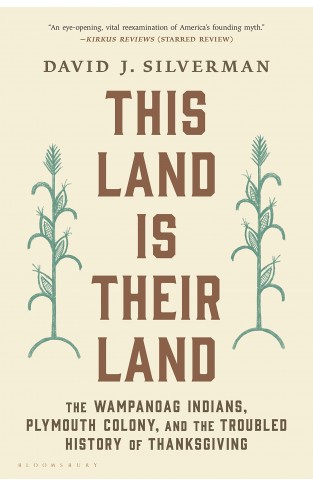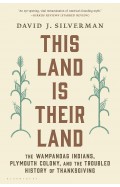- Home
- Books
- Sale
- Online Book Bazar Up To 60%
- This Land Is Their Land - The Wampanoag Indians, Plymouth Colony, and the Troubled History of Thanksgiving
This Land Is Their Land - The Wampanoag Indians, Plymouth Colony, and the Troubled History of Thanksgiving
By: David J. Silverman
-
Rs 1,516.00
- Rs 1,895.00
- 20%
You save Rs 379.00.
Due to constant currency fluctuation, prices are subject to change with or without notice.
In March 1621, when Plymouth's survival was hanging in the balance, the Wampanoag sachem (or chief), Ousamequin (Massasoit), and Plymouth's governor, John Carver, declared their people's friendship for each other and a commitment to mutual defense. Later that autumn, the English gathered their first successful harvest and lifted the specter of starvation. Ousamequin and 90 of his men then visited Plymouth for the "First Thanksgiving." The treaty remained operative until King Philip's War in 1675, when 50 years of uneasy peace between the two parties would come to an end.
400 years after that famous meal, historian David J. Silverman sheds profound new light on the events that led to the creation, and bloody dissolution, of this alliance. Focusing on the Wampanoag Indians, Silverman deepens the narrative to consider tensions that developed well before 1620 and lasted long after the devastating war-tracing the Wampanoags' ongoing struggle for self-determination up to this very day.
This unsettling history reveals why some modern Native people hold a Day of Mourning on Thanksgiving, a holiday which celebrates a myth of colonialism and white proprietorship of the United States. This Land is Their Land shows that it is time to rethink how we, as a pluralistic nation, tell the history of Thanksgiving.
In March 1621, when Plymouth's survival was hanging in the balance, the Wampanoag sachem (or chief), Ousamequin (Massasoit), and Plymouth's governor, John Carver, declared their people's friendship for each other and a commitment to mutual defense. Later that autumn, the English gathered their first successful harvest and lifted the specter of starvation. Ousamequin and 90 of his men then visited Plymouth for the "First Thanksgiving." The treaty remained operative until King Philip's War in 1675, when 50 years of uneasy peace between the two parties would come to an end.
400 years after that famous meal, historian David J. Silverman sheds profound new light on the events that led to the creation, and bloody dissolution, of this alliance. Focusing on the Wampanoag Indians, Silverman deepens the narrative to consider tensions that developed well before 1620 and lasted long after the devastating war-tracing the Wampanoags' ongoing struggle for self-determination up to this very day.
This unsettling history reveals why some modern Native people hold a Day of Mourning on Thanksgiving, a holiday which celebrates a myth of colonialism and white proprietorship of the United States. This Land is Their Land shows that it is time to rethink how we, as a pluralistic nation, tell the history of Thanksgiving.
This Land Is Their Land - The Wampanoag Indians, Plymouth Colony, and the Troubled History of Thanksgiving
By: David J. Silverman
Rs 1,516.00 Rs 1,895.00 Ex Tax :Rs 1,516.00
Zubin Mehta: A Musical Journey (An Authorized Biography)
By: VOID - Bakhtiar K. Dadabhoy
Rs 840.00 Rs 1,050.00 Ex Tax :Rs 840.00
The Origins of Political Order From Prehuman Times to the French RevolutioN
By: Francis Fukuyama
Rs 4,495.00 Ex Tax :Rs 4,495.00
Manning Up: How the Rise of Women Has Turned Men into Boys
By: Kay Hymowitz
Rs 995.00 Ex Tax :Rs 995.00
The Obama Syndrome: Surrender At Home War Abroad
By: Tariq Ali
Rs 1,036.00 Rs 1,295.00 Ex Tax :Rs 1,036.00
The Quest For Meaning: Developing A Philosophy Of Pluralism
By: Tariq Ramadan
Rs 1,116.00 Rs 1,395.00 Ex Tax :Rs 1,116.00
The Pakistan US Conundrum Jihadists The Military And The People The Struggle For Control
By: Yunas Samad
Rs 1,116.00 Rs 1,395.00 Ex Tax :Rs 1,116.00
An Enemy We Created: The Myth Of The Taliban Al Qaeda Merger In Afghanistan 19702010
By: Alex Strick van Linschoten
Rs 5,250.00 Ex Tax :Rs 5,250.00
WikiLeaks: Inside Julian Assanges War on Secrecy
By: David Leigh & Luke Harding
Rs 850.00 Ex Tax :Rs 850.00
No similar books from this author available at the moment.
No recently viewed books available at the moment.
Zubin Mehta: A Musical Journey (An Authorized Biography)
By: VOID - Bakhtiar K. Dadabhoy
Rs 840.00 Rs 1,050.00 Ex Tax :Rs 840.00
This Land Is Their Land - The Wampanoag Indians, Plymouth Colony, and the Troubled History of Thanksgiving
By: David J. Silverman
Rs 1,516.00 Rs 1,895.00 Ex Tax :Rs 1,516.00














-120x187.jpg?q6)





-120x187.jpg?q6)



-120x187.jpg?q6)



